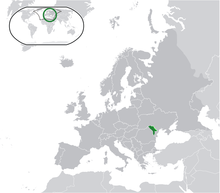
Back Geschichte der Juden in Moldawien German יהדות מולדובה HE 몰도바 유대인 Korean Istoria evreilor din Republica Moldova Romanian История евреев Молдавии Russian Moldova'daki Yahudilerin tarihi Turkish Історія євреїв Молдови Ukrainian
 | |
| Total population | |
|---|---|
| est. 85,000 to 120,000 | |
| Regions with significant populations | |
| 80,000–100,000[1] | |
| 4,000 to 15,000–20,000[2][3] | |
| ~1,000 | |
| Languages | |
| Hebrew (in Israel), Romanian, Russian, Yiddish | |
| Religion | |
| Judaism | |
| Part of a series on |
| Jews and Judaism |
|---|
The history of the Jews in Moldova reaches back to the 1st century BC, when Roman Jews lived in the cities of the province of Lower Moesia. Bessarabian Jews have been living in the area for some time. Between the 4th-7th centuries AD, Moldova was part of an important trading route between Asia and Europe, and bordered the Khazar Khaganate, where Judaism was the state religion.[4] Prior to the Second World War, violent antisemitic movements across the Bessarabian region badly affected the region's Jewish population. In the 1930s and '40s, under the Romanian governments of Octavian Goga and Ion Antonescu, government-directed pogroms and mass deportations led to the concentration and extermination of Jewish citizens followed, leading to the extermination of between 45,000-60,000 Jews across Bessarabia.[5][6] The total number of Romanian and Ukrainian Jews who perished in territories under Romanian administration is between 280,000 and 380,000.[5]
Today, the Jewish community in Moldova has been revived and are primarily represented by the Jewish Community of the Republic of Moldova (JCM) organisation. The group was registered in its current form in 1997, but its roots stretch back to founding of the Union of Jewish Communities in Bessarabia on 3 November 1935.[7] The group estimate that the total population of Moldovan Jews in 2022 to be approx. 20,000.[8] The World Jewish Congress (of which the JCM is an affiliate member) states that there has been "a widespread development of a national self-consciousness and a return to their roots by the Jews of Moldova, with Jewish identity and culture being celebrated in a number of forms".[9] Diplomatic relations with Israel began in 1992 and the Israeli consulate is located in the capital city, Chişinău. Since 2014, Moldova has been an observer country to the International Holocaust Remembrance Alliance, and since 2019 has adopted the IHRA Working Definition of Antisemitism for official use. The Museum of Jewish History was opened in Orhei on 30 January 2023.[10]
There is one Jewish kindergarten in Chişinău, two Jewish schools and a municipal Jewish library named after Itzik Manger. A Jewish newspaper, Nash Golos ("Our Voice"), is published twice a month by the Jewish Community of the Republic of Moldova.[9] There is a Jewish Cultural Center in Chişinău, as well as seven synagogues, with synagogues also present in Orhei, Soroca, and Tiraspol, and "Memorials to the Kishinev ghetto, to the Victims of Fascism, to the Victims of Chişinău Pogrom are sites for remembrance in Chişinău."[9] Other organisations include Chabad Lubavitch Moldova and Kedem.
The constitution of Moldova guarantees the right to freedom of religion and the total separation of church and state, while noting the "exceptional importance" of Orthodox Christianity.[8] Holocaust denial and insulting the memory of the Holocaust are criminal offences.[8] The "production, sale, distribution, or public use of fascist, racist, or xenophobic symbols or ideology, unless used for art, science, or education. The law prohibits the promotion of xenophobia, racism, fascism, and hatred and violence on ethnic, racial, or religious grounds."[8] Since 2015, 27 January is annually recognised as the National Holocaust Remembrance Day.[9] In 2016, the Moldovan parliament endorsed the Final Report of the International Commission on the Holocaust in Romania by Elie Wiesel. Discrimination on the basis of religious affiliation is illegal, and incitement to religious and ethnic hatred was made illegal in May 2022.[8]
- ^ "Ambasada Republicii Moldova în Statul Israel". israel.mfa.md. Archived from the original on 30 March 2018. Retrieved 15 December 2015.
- ^ "The Jewish Virtual World—Moldova". Jewish Virtual Library. Retrieved 14 December 2015.
- ^ "Introduction and History of the Jews in Moldova".
- ^ "120 years anniversary of the Kishinev (Chisinau) Pogrom, 1903". City Council of Chișinău – 120 years anniversary of the Kishinev (Chisinau) Pogrom, 1903. Retrieved 4 August 2023.
- ^ a b "Final Report of the International Commission on the Holocaust in Romania" (PDF). United States Holocaust Memorial Museum. 11 November 2004. Retrieved 4 August 2023.
- ^ Solash, Richard (8 April 2012). "Archive Reveals New Details of Holocaust in Moldova". Radio Free Europe/Radio Liberty. Retrieved 4 August 2023.
- ^ "About Us – JCM". Jewish Community of the Republic of Moldova. Retrieved 4 August 2023.
- ^ a b c d e "2022 Report on International Religious Freedom: Moldova". United States Department of State. Retrieved 4 August 2023.
- ^ a b c d "Community in Moldova (Republic of) – World Jewish Congress". World Jewish Congress. Retrieved 4 August 2023.
- ^ "Opening of Orhei Jewish Museum – JCM". Jewish Community of the Republic of Moldova. 1 February 2023. Retrieved 4 August 2023.
© MMXXIII Rich X Search. We shall prevail. All rights reserved. Rich X Search